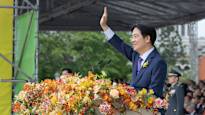It was even feared that China would invade Taiwan militarily after the president’s line speech. At least China did not immediately start military exercises.
BEIJING Taiwan’s new president Lai Ching-ten the first policy speech about his country’s problematic relations with China was more moderate than expected.
Lai chose his words carefully in his Taiwan National Day speech.
He both toughened the big neighbor and offered him cooperation. The latter has not been heard from the politicians of Taiwan’s Democratic Progressive Party in recent years.
Lai said that China has no right to represent Taiwan, where “democracy and freedom prevail” in international arenas.
He made it clear that Taiwan is ready to defend its sovereignty militarily if necessary.
Taiwan has not been militarily threatened by countries other than China in recent years.
China has not recognized Taiwan, which has a population of over 23 million, but still considers it a rebel province.
Together to combat climate change
As a counterbalance to the hardening, Lai offered China the opportunity for cooperation.
In Lai’s opinion, China should take more responsibility for solving international crises such as Russia’s war of aggression and conflicts in the Middle East.
– We hope that China bears its responsibility alongside Taiwan and strives to promote peace, security and prosperity both in the neighboring regions and globally, Lai formulated.
– We are ready to work with China to prevent climate change and the spread of infectious diseases and to increase regional security on both sides of the Taiwan Strait.
It was the first National Day speech of Lai, who won the presidential election in January.
On October 10, 1911, the Wuchang Uprising that ended the Chinese imperial power began. The Chinese, who fled the communists to the island of Taiwan in 1949 and established their own state there, consider October 10 as their national day.
The US warned China in advance
Lai, who turned 65 last Sunday, is a pro-Western politician who has been in the grip of China’s communist regime for a long time.
During the election campaign, the Chinese mainstream media accused Lai of being a separatist. His first policy speech was also closely watched in Beijing.
At the beginning of the week, China increased the readiness of its naval forces in the vicinity of the Taiwan Strait. It has been suspected that China will start additional military exercises in the region.
The US State Department on Wednesday warned China against using Lai’s speech as a pretext for increasing military tension in the South China Sea.
At least by Thursday’s early evening, Lai’s speech had not elicited any specific comments about China.
Taiwanese experts considered it possible that China will start a naval war exercise near Taiwan in the coming days.
